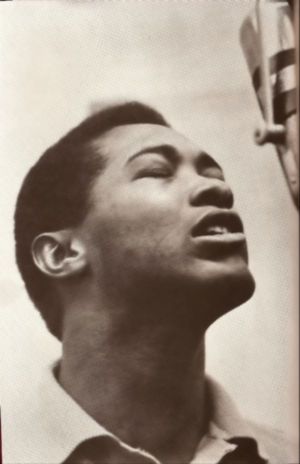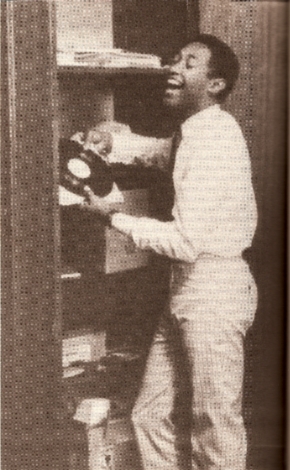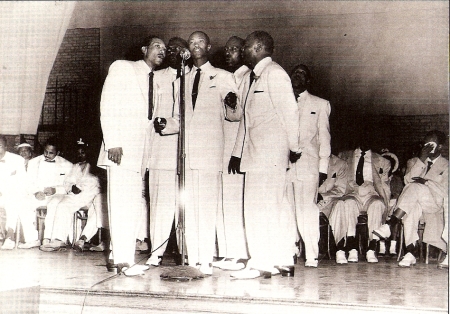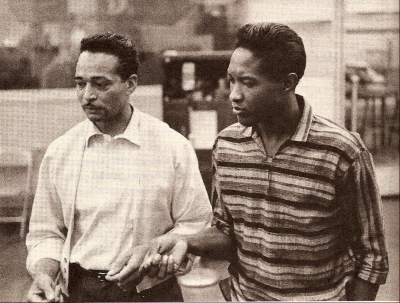Sam Cooke
From fifties
Sam Cooke was an American original and a true musical pioneer. As an artist, he wrote and performed some of pop music's most beloved songs, such as, 'What A Wonderful World', 'Bring It On Home To Me', 'Cupid', and 'You Send Me' and his influence is unquestionable. His roots lie in gospel and R&B music, and his considerable skills and talent propelled him into the stratosphere of soul music and rock and roll during the 1950's and early 1960's. Indeed, many consider him to be the 'king of soul'.
Not only was he a renowned songwriter and performer, but he is significant for being one of the first black artists to assume control of the business side of his music. At the time, few musicians, regardless of color, were achieving the level of success that Cooke was, and for all too brief a moment, he stood at the top of his game. This legendary talent is also noteworthy for his involvement in the Civil Rights Movement whereby he brought blacks and whites together through his music, ultimately composing the anthemic civil rights protest song 'A Change Is Gonna Come'.
Contents |
[edit] Growing Up
Samuel Cook was born January 22, 1931 in Clarksdale, Mississippi. The 'e' was later added to Cook because Sam thought it sounded classy. He and six other siblings were the children of Annie May and the Rev. Charles Cook. The hub of the northern delta, Clarksdale was situated about halfway between New Orleans and Memphis on the railroad line. It was also a key spot where the blues came together; it was here, after all, that legend tells us Robert Johnson went down to the crossroads at midnight and struck a pact with the devil in exchange for his prowess on the guitar. Around the time of Sam's birth, 'race music' was beginning to find its way into the public consciousness via the 78 RPM medium of the day and soon, portable recording studios were springing up all around the delta to capture the blues sound that was starting to sell so astoundingly. In addition, spiritual (church) music was extremely important in the region. Congregations, like the Holiness Church where Sam's father presided, drew a special energy from music. There was a particular emphasis on rhythm that culminated in a real spirit-raising experience. It embodied more the vibe of a juke joint rather than a church. Yes, music was around Sam all his life and according to his father, Sam was singing practically from the start. The combination of hearing local street vendors singing the praises of their wares, along with blind guitarists strumming the blues in his neighborhood, not to mention preachers injecting powerful emotion into the hymns that they lead, all tremendously influenced Sam.
While Sam was still a small child, the family relocated to Chicago. They lived in 'Bronzeville', the 1st major Negro urban center in the U.S. which held roughly 90% of the city's colored population, and Rev. Cook was made pastor of a small congregation in Chicago Heights. It was here that Sam, along with his siblings, would form his first musical group, the 'Singing Children'. They would perform in church and eventually even got a manager and began arranging more performances and selling tickets, actually making money sometimes. Often, Sam would go off on his own to where the streetcars changed and sing pop songs of the day and occasionally, people would toss him some change. Other times, he would sneak in to a local bar at the end of the day; go from barstool to barstool, singing for money. This was not exactly what his father would have had in mind, but it kept Sam from thieving. Even though the 'Singing Children' were increasingly being asked to warm-up their father's congregation and get everyone all riled up about Jesus, Sam was still not allowed to sing leads, only his older siblings got to do that. However, he had his eye on a local male gospel quartet that he was very impressed with called the 'Soul Stirrers'.
Besides gospel, electric blues had arrived on the scene and was accessible to Sam by means of standing outside the doors of nightclubs, like the 'Macomba'. The club was owned by future Chess Records founders Leonard and Phil Chess, notable for putting out records by Muddy Waters and Howlin' Wolf. Again, his dad would never have approved of his adventures, but was none the wiser. Here he would absorb the likes of Ella Fitzgerald and Billy Eckstine and pine away for the chance to demonstrate his talents. By the time he graduated high school, Sam was the leader of 2 of the 3 top young gospel quartets in the city.
[edit] Early Career
Sam was restless, but soon found an outlet with a few friends in a high school gospel quartet called the 'Highway QCs'. The group would perform in area churches to much acclaim, but Sam's star was rising and couldn't be contained for long. By the age of 19, he had joined popular local gospel group, the 'Soul Stirrers', as lead singer and was on his way to fame in the gospel world. By 1950, the 'Stirrers' were signed to Specialty Records when Sam came on board and his instinctive and unique singing style elevated them to true gospel greatness; consequently, they very quickly became top sellers. His maturing voice seldom failed to command attention, eloquently meandering its way through such gospel staples as 'Peace In The Valley' and, especially, 'Jesus Gave Me Water' to great success with the 'Soul Stirrers' and they toured the south extensively. All too often, the group was confronted with racism and segregation and had trouble simply finding places to stay while they were on the road. To his credit, Sam refused to play to segregated audiences and scored some early victories in successfully performing for integrated crowds. Through much perseverance, the 'Stirrers' gained a solid reputation and Sam especially continued to flourish.
Occasionally around this time, Sam would begin to insert a few original songs here and there, but the focus stayed primarily on more traditional, gospel fare. However, a new kind of music, a hybrid of rhythm and blues mixed with country and western, was just then coming into vogue. Specialty label head, Art Rupe, was determined to mine this new market. In early 1952 he enjoyed some success recording a young vocalist named Lloyd Price, singing a song called 'Lawdy Miss Clawdy' with the help of Fats Domino and his band down in New Orleans. It became Specialty's first major hit rising to #1 and pointed the direction of things to come. Gradually, the 'Stirrers' began implementing electric guitar and drums, among other things in an attempt to keep abreast of changing musical trends.
[edit] Rise to the Top
Sam was determined to rise to the next plateau and in 1956, he got his chance. He had been stockpiling a cache of original pop tunes for the past several years when he finally convinced Art Rupe to take a shot on him as a solo artist. He recorded several of his original compositions and released his first pop single, 'Lovable' in 1956 under the moniker 'Dale Cook' so as not to dismay loyal fans of the 'Soul Stirrers'. Audiences however were not fooled; Sam's singing style was way too distinctive to be disguised pseudonymously. Soon, Sam and his producer, 'Bumps' Blackwell parted ways with Rupe and Sam embarked on a solo career under his own name, adding the 'e' to the end. Now recording for Keen Records, Sam hit pay dirt with his first crossover #1 on the Billboard pop chart, 1957's 'You Send Me', which remained at the top for three weeks.
Over the course of the next several years, Sam would score hit after hit, and on top of being a very successful songwriter and performer, he eventually formed his own record label, SAR Records. Here, he recorded and helped advance the careers of fellow artists such as Johnnie Taylor, Bobby Womack, and even his old group, the 'Soul Stirrers'. Additionally, Sam created his own publishing and management organization, gaining considerable control over his own business affairs. In the wake of these trailblazing efforts, Sam exited the Keen label and signed up with RCA Victor where he enjoyed huge hits with the likes of 'Chain Gang', 'Bring It On Home To Me', 'Another Saturday Night', and 'Twistin' The Night Away'. His success on the singles charts was staggering; he had a total of 29 top 40 hits on the pop charts and even more on the R&B charts. Sam also released several critically acclaimed, full-length albums, including his eponymous 1957 debut, the heavily blues-informed 1963 LP, 'Night Beat', and the hits-laden 1964 classic, 'Ain't That Good News'.
[edit] Final Days
Throughout all this, Sam was bridging a racial gap, bringing white and black audiences together through his music. While on tour in October, 1963, Sam was attempting to check into a hotel in Shreveport, Louisiana where he had made reservations and was turned away upon arrival because he was black. Sam refused to leave and was arrested and thrown in jail. Inspired by these events, in 1964 he composed what many believe to be his finest song, a civil rights anthem called 'A Change Is Gonna Come'. It was Sam's answer to Bob Dylan's ephemeral 'Blowin' In The Wind' and echoed his conviction that peace, harmony and equality among the races was not only possible, but absolutely necessary. It seemed the sky was the limit for Sam Cooke; he had created a string of hits, many of which over time would become standards, and he was lucky enough to get to enjoy some of his hard earned success.
Unfortunately, it all came crashing down on December 11, 1964. At the age of 33, Sam was senselessly gunned down by a motel manager in south Los Angeles. The details are sketchy and a matter of conjecture to this day, but allegedly Sam and a prostitute had checked into a motel and while Sam was taking a shower, the girl rolled him, taking his money and even his clothes so he couldn't chase after her. Soon, wearing nothing more than a shoe and an overcoat, he made his way to the manager's office, as he assumed her to somehow be in on the scheme, (apparently, the hooker had suggested the motel, leading Sam to suspect a connection). The manager, a woman named Bertha Franklin, claimed she felt threatened for her safety, owing to what she said was erratic behavior on Cooke's part. Franklin fired three shots, ultimately, mortally wounding Sam. Although the verdict came down as justifiable homicide in self-defense, there continues to be much speculation and it is believed that essential details never came to light in court, suggesting a possible cover-up. Nevertheless, Sam Cooke was laid to rest in Forest Lawn Memorial Park Cemetery in Glendale, California. His music and his legend live on.
Fab and Fraught indeed.
[edit] References
Dream Boogie: The Triumph of Sam Cooke
Peter Guralnick, 2006
Sam Cooke: Legend
VH1 Documentary, 2003
You Send Me: The Life and Times of Sam Cooke
Daniel Wolff, 1995
[edit] External Links
- Wikipedia Sam Cooke
- Sam Cooke allmusic.com
- Our Uncle Sam: The Sam Cooke Story From His Family's Perspective
- Dream Boogie: The Triumph of Sam Cooke
- Sam Cooke (ABKCO Homepage)
- The Songs of Sam Cooke
- Rosco Gordon interview
- Sam Cooke's Gravesite
- Sam Cooke Guitar Tabs
- History of Rock and Roll Sam Cooke
- Article Discussing Sam Cooke's death
- Sam Cooke's Swan Song of Protest NPR special on the selection of "A Change Is Gonna Come" to the National Recording Registry
- A Star Is Dead




